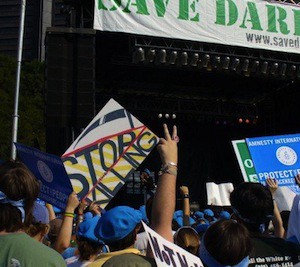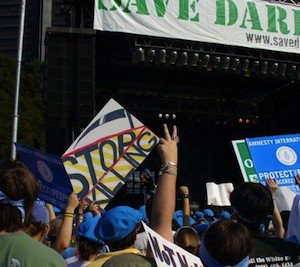An Open Letter to Omar al-Bashir, President of Sudan
by Patrice Hutton


This month, thousands of college students attended “activity fairs” and found groups that moved them. What will they learn? How many lives will they save? Here, a primer on the experience.
Dear Omar al-Bashir, President of Sudan:
You timed your genocide impeccably. When the world first noticed, I was 18 years old, a college freshman who needed extracurricular activities. I lived in a dorm with too many bros, and because I wanted to avoid Super Bowl Sunday, I jumped when a poster offered me a weekend getaway: a stricken African, beckoning me to D.C.’s Holocaust Museum. We’d stop genocide at the conference!
Seven conferences later, you had not relented. And thankfully! Jumping from extracurricular to extracurricular doesn’t look good on a resume. Genocide stopping became the perfect extracurricular. And since genocide stopping is a complex affair, our work took on whatever form we wanted. Some advocacy here, some publicity there, and baked goods whenever we were short on cash. All to stop genocide. How could a future employer ever balk at that line on a resume? Your actions gave a generation of American college students a hobby.
We made big sacrifices. Gave up dance and newspaper and crew. Learned before the rest of the world that a Blackberry was no longer a fruit; it was a device from which to fight genocide, anytime, anywhere. Save Darfur’s ads in the DC Metro and the New York Times validated our work; thank God we weren’t the passengers sitting beneath the ads, reading the paper, unaffected. They were bystanders. We were upstanders. Standing up against your genocide.
Beyond padding our resumes, your genocide gave the women of our generation two very important things: fashion and men. Green “Save Darfur” wristbands became the accessory of the mid-2000s. Graphic designers perfected outlines of Africa and Africans, and we got American Apparel to print shirts in every size and color. To this day, there are always more genocide t-shirts at the bottom of my laundry basket. Our laptops and Nalgenes fought too, plastered with phrases like “Not on My Watch.” This is how we spotted the men. Looked for the stickers and t-shirts. Guy with a wristband approaches you at at bar? Pre-vetted. Cosmopolitan said it best when they named Darfur rallies one of “The Best Places to Meet a Guy.”
I’ll tell you a secret: your genocide bred a lot of love. When you’re one of eight college students sitting around a conference table (self-named as a “National Managing Committee”) tasked with stopping genocide, you’re bound to fall for the other people at the table. Hookups happened, of course (genocide making for exceptional pillow talk), but I’m talking about a brand of comradeship that your Janjaweed should study. We partied late into the night, but we never stopped fighting. I documented our planning retreats with Facebook albums named things like “I love you more than anything, especially Janjaweed.”
Between retreats, we sustained our love with conference calls. Wednesdays, 9:15 p.m., we’d stop everything to dial in. But I confess: not always. Sometimes I remained in the library, only piping up when I had to. Once, I put the line on mute so that the group couldn’t hear the chop-chop-chop of my friends chopping down a tree in a municipal park. One night I gazed through a telescope, taking in a lunar eclipse, as the eight of us fought over our logo. But parks and libraries and family dinners and lovers’ beds aside, every Wednesday we convened to fight. We argued about UN vs. NATO forces and fonts. All in the name of recruiting students to fight your genocide.
While your genocide often caused me to neglect my education, it provided me with an education of its own. I learned to write press releases. I learned to throw frat parties. I learned to draft legislation. I learned about booze, men, and which heels to wear with suits when you’re going clubbing later. I learned that it’s illegal to intern in a congressional office while lobbying in others. I learned that it’s possible for a house of activists to booze on the first floor while drafting legislation on the second. I learned where your country is.
It was bittersweet, Mr. Bashir, to graduate and leave the ranks of student activism. My Wednesday nights grew lonely. I had no built in audience for Holocaust jokes. No more waking up on floors at whatever-the-hell-Ivy-League we were training activists at. No more toasts to stopping genocide. I stopped following the news stories. “What’s happening in Darfur?” people asked. I’d shrug. Because I didn’t know. Few of us really know all along. We’d simplified your conflict down to the basics. Darfuris vs. Janjaweed, re: land. The easier it was to explain the easier it was to recruit. These days, perhaps the activists are better at recruiting than you are, Mr. Bashir. Now, they’re “training leaders,” who aren’t to worry if a conference is scheduled for an SAT weekend because one can spend the morning taking the SAT in D.C. and the afternoon fighting genocide! (Are you making the same accommodations for your young leaders?).
Will your genocide continue to provide opportunities for America’s college students? Or will they have to try and engage the public on Burma or Syria? It’s their turn to lobby, to love, and since KONY 2012 is so last year, they need you. The spotlight’s yours again. There’s a new group of kids ready to fight, fail, and then spend their mid-twenties wondering how things would have gone if they’d sold another t-shirt or divested another municipality. Or forgetting to wonder because we’ve all moved on rather gracefully. We’ve discovered poverty and the Tea Party and educational inequality, and your assistance with our resumes landed us handsome positions from which to fight. We’ve discovered smugness elsewhere, even if it’s not about fighting your crime of all crimes.
Sincerely,
Patrice Hutton
STAND: A Student Anti-Genocide Coalition, Founding Member
Patrice Hutton is the director of Writers in Baltimore Schools. She’s currently a graduate student in writing at Johns Hopkins University. Her fiction appears in Mount Hope Magazine, Prime Number Magazine, and Outside In Literary & Travel Magazine.